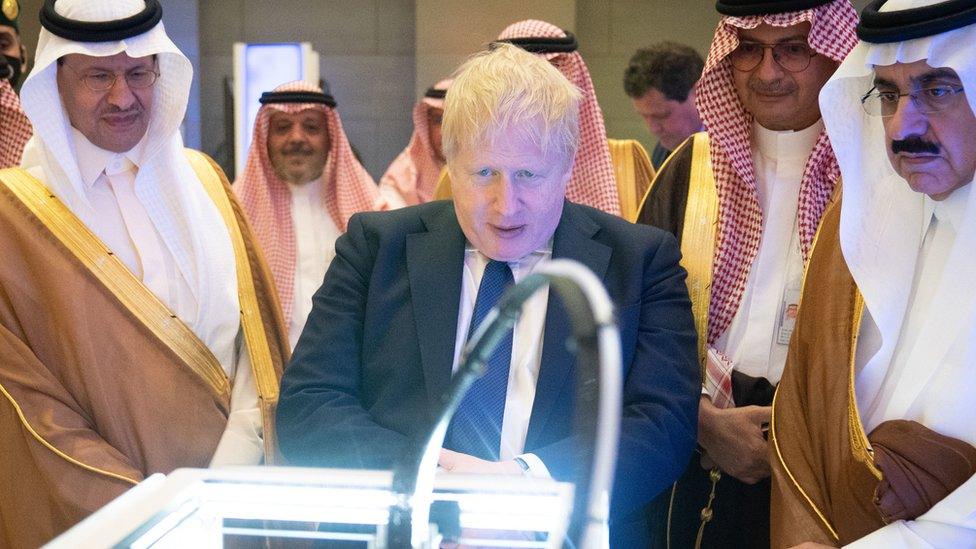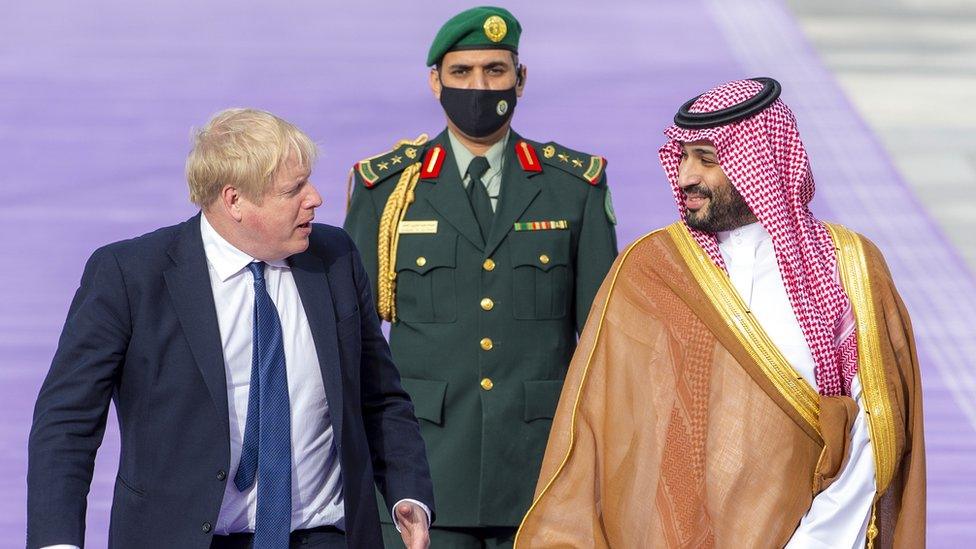Boris Johnson still faces energy questions after Saudi trip
- Published

Politicians tend to enjoy the fuss that comes with a foreign trip.
They are treated to banquets, and asked to inspect the guard.
They are whisked through city centres in convoy at high speed racing to their next engagement, untroubled by queues at passport control, unworried by forking out an unreasonable amount for a cup of tea at volcanic temperature, nervous it will spill in your lap when the plane flies through a bumpy patch.
Even when the subject matter is fraught, they are moments when the trappings of power are on full display.
I've seen staff frantically sweep already immaculate red carpets just before the leader arrives, and flags carefully arranged to avoid the hideous protocol mistake of offending a visiting dignitary.
Officials around the world murmur in hushed tones of the arrivals of the "VVIPS" at summits or ceremonies - yes, Very Very Important Persons, not even your standard three letter abbreviation.
Then all at once, the plane touches down, the cars swoop in, the dignitaries perform their grip-and-grin photo moment, then are ushered away from the cameras.
And that of course, is when the real work begins.
However perfect the photo ops, the carefully designed presentations and local tours, it's what can be achieved by leaders face to face that really counts.
Much of the heavy lifting is done before the bosses arrive, to prepare possible areas of agreement and the language of political meetings: the "bilats" , the "tours de table", the "communiques" - or in other words, a meeting of two people, pre-arranged filming of a group of leaders sitting down, and the final agreement on paper.
Trips always produce memorable moments: whether it was watching a bemused George Osborne have to smash open a chicken that had been baked in clay on a golden boat in China (I'm not making this up), or Donald Trump grabbing Theresa May's hand to walk down the ramp outside the White House.
Or today, watching the nerves, then the hope, then the joy spread among Downing Street advisers and staff as they inched closer and closer to being sure that Nazanin Zaghari-Ratcliffe really, really was on a plane on her way home.
But whatever weird and wonderful events take place, foreign trips often fail to secure the ambition that was publicly touted before anyone left home.

Boris Johnson's trip to Saudi Arabia has proved controversial among some in the UK
In this case, Boris Johnson leaves the Middle East without any guarantees that energy producers are suddenly going to allow more oil and gas to flow West.
There were discussions, agreement he claimed, on the importance of a stable energy supply. He said that Saudi Arabia had expressed an interest.
But concrete public commitments came there none, beyond a general agreement that the two countries will work closely together, and one specific announcement about investment going to green energy in north-east England.
He and the Saudi leader hardly skimped on the talks, speaking alone for around an hour and three quarters, literally leaving staff outside twiddling their thumbs.
Expectation management
In reality, the expectation in government was not of some giant breakthrough immediately.
With big policy problems like the enormous question of redesigning how the world keeps the lights on, conversations that could create solutions can't be quick, and they have to start somewhere.
But other government departments were sceptical about what Boris Johnson was up to, describing the trip as "typical - short-term gain and medium-term pain" from No 10, raising expectations and possibility then disappointing when they could not be delivered.
That's quite aside from the predictable, yet pointed, criticism of the UK's association with Saudi Arabia.
It's a relationship that's been controversial for many years, and for many reasons. But the nature of this visit has rankled even some Tory MPs.
With three more executions of Saudi citizens announced while the prime minister was in the country, it's hard to see how he can completely justify his claim that the country is really changing.
Pressure on bills
He admitted his discomfort today at having to broach such subjects.
But his decision not to divulge how he raised concerns with Saudi Crown Prince Mohammed bin Salman makes it impossible to assess how strongly he made the UK's objections plain.
During his trip, the prime minister promised plans to keep the lights on next week.
He told us that this energy security strategy would include proposals to put the accelerator on new nuclear, renewables, and energy supplies at home.
Pressure on bills is only going in one direction. It seems unlikely the promise of more Middle Eastern supply will feature in the solutions any time soon.
Yet the reality of how we'll all face economic consequences of what is happening in Ukraine won't wait.
Related topics
- Published15 March 2022
- Published12 March 2022

